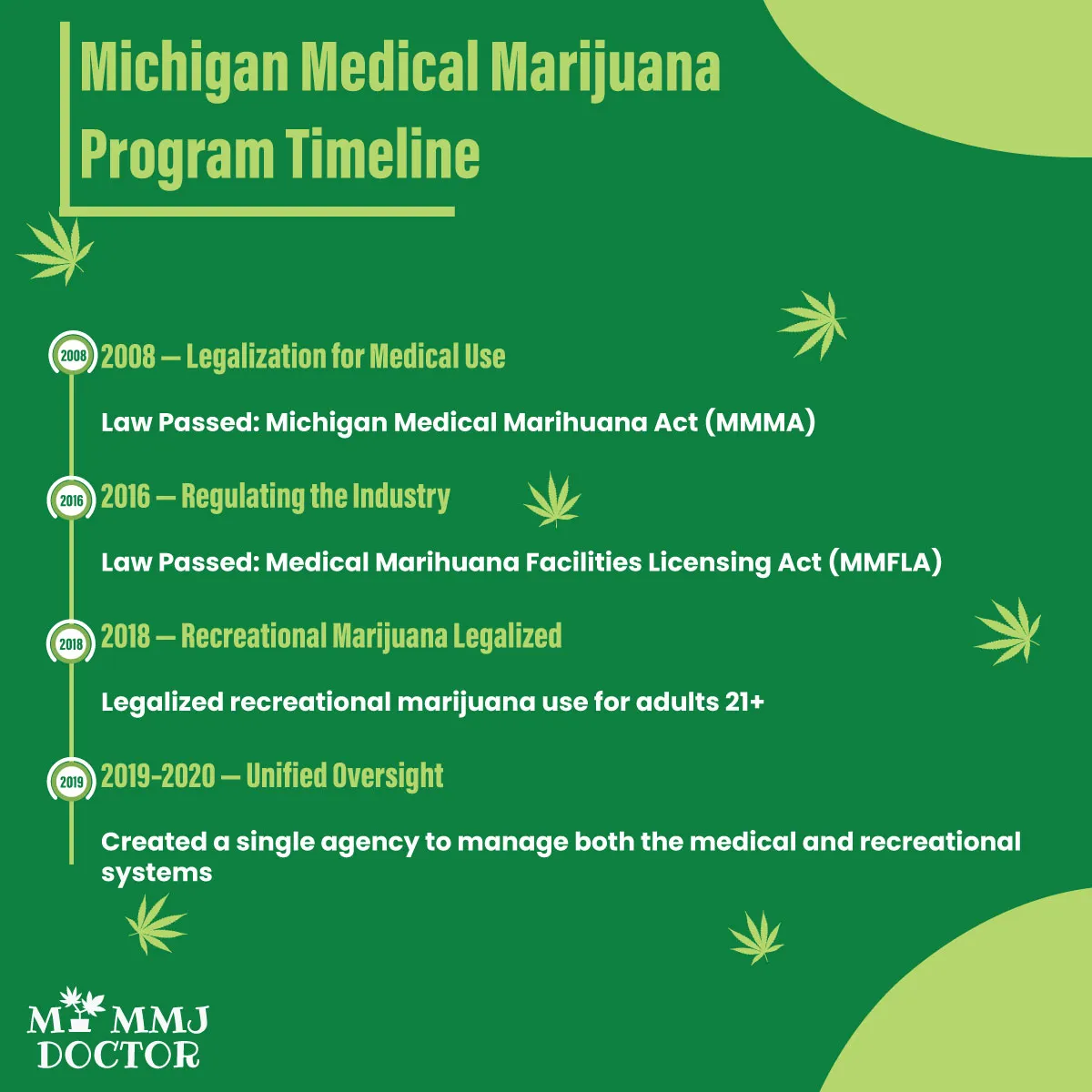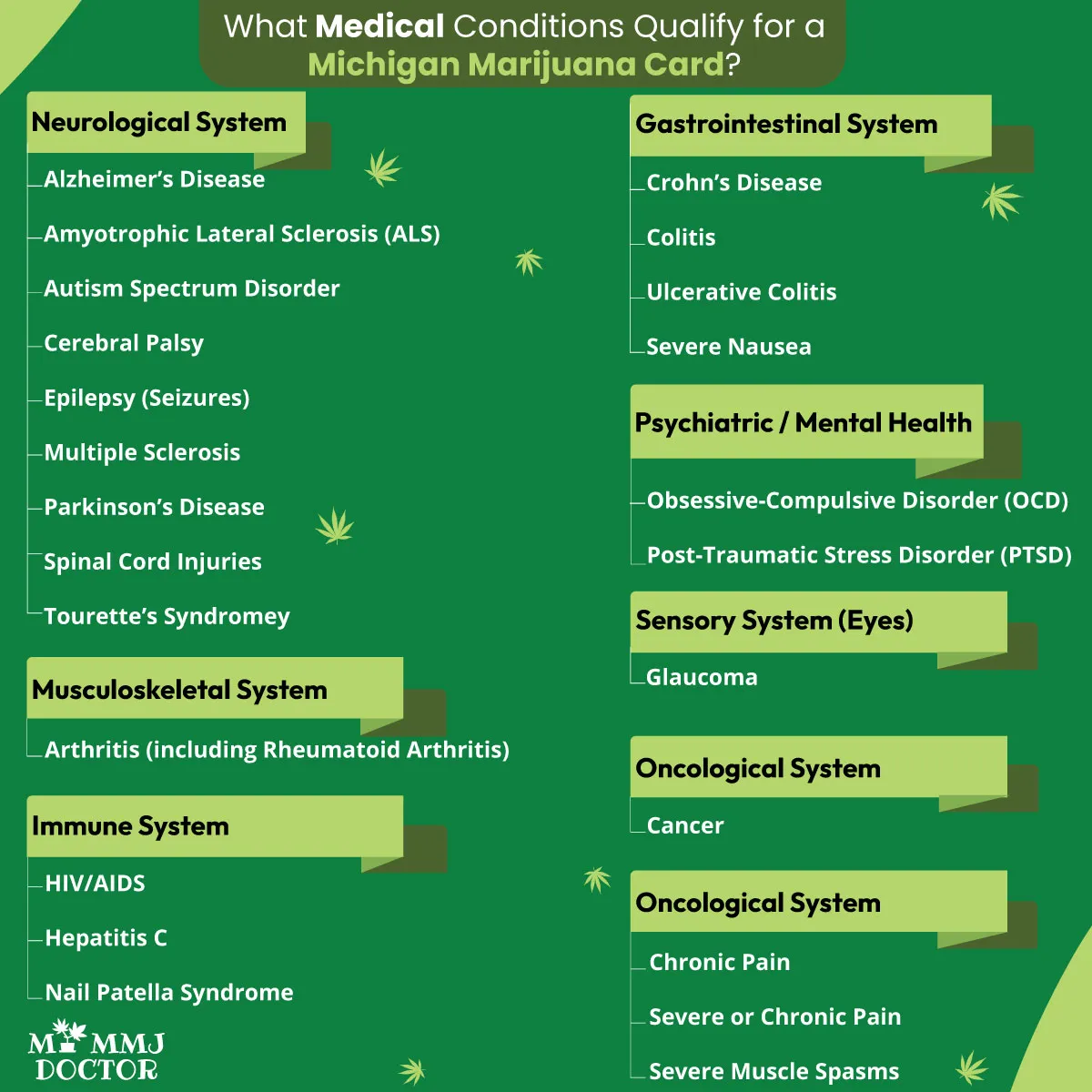
Medical marijuana has been legal in Michigan since 2008, helping thousands of residents manage chronic pain, anxiety, cancer symptoms, and more. But knowing what’s allowed – and what’s not – can get confusing. That’s why we created this simple guide to Michigan weed laws.
Whether you’re a patient looking to apply for a card in Michigan, a caregiver supporting someone in need, a healthcare provider trying to stay informed, or just a curious Michigan resident – this guide is for you. We’ll walk you through the basics, answer your questions, and help you stay on the right side of the law. If you live in Michigan and want to understand how medical marijuana really works here in 2025, you’re in the right place.
Key Points:
- Medical cannabis has been legal in Michigan since 2008, with distinct rules from recreational use. The program offers legal protections, access to high-potency products, and tax benefits for patients 18 and older.
- The Michigan Cannabis Regulatory Agency (CRA) oversees licensing and safety. Patients can qualify with approved medical conditions and apply for a card through a doctor’s certification and state registration.
- Cardholders can legally possess, use, and cultivate marijuana within specific limits. However, usage is restricted in public areas, while employment and DUI laws still apply.

Overview of Michigan Medical Marijuana Program
Let’s take a moment to understand how Michigan’s medical marijuana program got started, how it’s grown over time, and who’s in charge of keeping everything safe and legal. Whether you’re new to medical cannabis or just looking to get a clearer picture, here’s what you need to know:
What Should You Know About Michigan’s Medical Marijuana Program?
Michigan has come a long way with medical marijuana. Here’s how it all unfolded:
- 2008: Michigan passed the Michigan Medical Marihuana Act (MMMA), allowing qualifying patients to use and grow marijuana for medical reasons with a doctor’s recommendation. This made Michigan the 13th state in the U.S. to legalize medical cannabis.
- 2016: The Medical Marihuana Facilities Licensing Act (MMFLA) created a regulated system for commercial medical marijuana businesses, including growers, processors, and dispensaries (called provisioning centers in Michigan).
- 2018: Voters approved Proposal 1, legalizing recreational marijuana. While this expanded access, the medical program remained separate and still provides benefits like tax savings and higher purchase limits for patients.
- 2019–2020: Oversight was streamlined under a new agency to better manage both medical and recreational cannabis systems.
Who Regulates Medical Marijuana in Michigan?
- Michigan Cannabis Regulatory Agency (CRA)
The CRA is the main agency responsible for regulating marijuana in Michigan. This includes licensing dispensaries, setting rules for safe use, ensuring lab testing, and monitoring both medical and adult-use cannabis markets. If you’re applying for a medical marijuana card or want to check if a dispensary is licensed, the CRA is your go-to source. - Department of Licensing and Regulatory Affairs (LARA)
LARA supports medical professionals and regulates the healthcare side of things. They help oversee physician certifications and maintain compliance with state health standards.

What are Qualifying Conditions for a Michigan Medical Marijuana Card?
To apply for a Michigan medical marijuana card in 2025, you must have one or more of the following qualifying conditions:
- Alzheimer’s Disease
- Amyotrophic Lateral Sclerosis (ALS)
- Arthritis, including:
- Rheumatoid Arthritis
- Autism Spectrum Disorder
- Cancer
- Cerebral Palsy
- Chronic Pain
- Glaucoma
- Hepatitis C
- HIV/AIDS
- Inflammatory Bowel Diseases, including:
- Colitis
- Crohn’s Disease
- Ulcerative Colitis
- Nail Patella Syndrome
- Obsessive-Compulsive Disorder (OCD)
- Parkinson’s Disease
- Post-Traumatic Stress Disorder (PTSD)
- Spinal Cord Injuries
- Tourette’s Syndrome
- Any condition or treatment causing one or more of the following:
- Cachexia (Wasting Syndrome)
- Multiple Sclerosis
- Seizures or Epilepsy
- Severe Muscle Spasms
- Severe Nausea
- Severe or Chronic Pain
These are all officially recognized by the Michigan Cannabis Regulatory Agency. If your condition is on the list, you may qualify to use medical cannabis legally.
What If Your Condition Isn’t on the List?
Here’s how you (or your caregiver or doctor) can petition:
- Submit a written request to the Michigan Cannabis Regulatory Agency.
- Include medical evidence, research, and how the condition affects your quality of life.
- The agency will review the evidence and open a public comment period.
- If approved, your condition gets added to the official list.
This process takes time, but it’s part of what makes Michigan’s program responsive to real patient needs.
Quick Tips:
- Always consult with a licensed medical marijuana doctor in Michigan for proper evaluation.
- Your doctor must confirm that medical marijuana could help with your symptoms.
- Not every doctor is authorized or willing to certify you—so find one who specializes in cannabis medicine.
What Other Medical Cannabis Laws and Protections Exist in Michigan?
1. Possession Limits for Patients and Caregivers
- Patients with a valid MMJ card can legally possess:
- Up to 2.5 ounces (about 71 grams) of usable marijuana on their person.
- Up to 10 ounces stored at home.
- Registered caregivers (assigned to up to 5 patients) may possess up to:
- 2.5 ounces per patient.
- A total of 12 marijuana plants per patient for cultivation.
Tip: Always store your cannabis in a secure place, especially at home.
2. Age Restrictions
- Patients must be 18 or older to apply for a medical marijuana card on their own.
- Patients under 18 need a parent or legal guardian to apply and act as their caregiver.
- Caregivers must be at least 21 years old and pass a background check.
3. Where You Can (and Can’t) Use Medical Marijuana in Michigan
- You can legally consume cannabis:
- In a private home or on private property (with permission).
- You cannot use marijuana:
- In public places (like parks, sidewalks, or outside businesses).
- In schools, correctional facilities, or on federal land.
- In your car—even if you’re parked. It’s still illegal to use it there.
4. Employment Protections (and Limits)
- Michigan law doesn’t force employers to accommodate marijuana use – even medical.
- You can still be fired or not hired if you fail a drug test, even with a valid card.
Pro tip: Talk to your employer or HR team if you use medical marijuana – especially in safety-sensitive jobs.
5. Driving Under the Influence (DUI) Laws in Michigan
- It’s illegal to drive under the influence of marijuana—yes, even with a medical card.
- Law enforcement can arrest you if they believe you’re impaired while driving.
- There’s no set “legal limit” for THC like there is for alcohol, so play it safe.
Tip: Wait at least 4–6 hours after using cannabis before driving, depending on the method of use and your tolerance.

How to Legally Grow Medical Marijuana at Home in Michigan?
1. How to Legally Grow Your Medical Marijuana Plants at Home in Michigan?
- Only registered medical marijuana patients and caregivers can grow plants at home.
- You must have a valid Michigan Medical Marijuana Program (MMMP) card.
2. What is the Maximum Number of Plants Allowed?
- Patients: Can grow up to 12 marijuana plants for personal use.
- Plants must be grown for medical use only – not for resale.
3. Indoor vs. Outdoor Cultivation Rules
- You can grow indoors or outdoors, but plants must be kept out of public view.
- Outdoor grows must be in a locked, enclosed space—fenced, gated, and secure from the outside.
- Indoor grows should be in a locked room or area only accessible to the registered grower.
4. Zoning and Local Rules
- Always check with your city or county – some areas have extra zoning laws.
- Growing marijuana may be banned or restricted in certain residential zones.
- You might need additional permits or meet property size requirements in some municipalities.
5. Secure Storage Is a Must
- Keep your grow site safe, clean, and protected from unauthorized access—especially from children or pets.
- Unauthorized sharing or visible growing can lead to legal trouble.
Purchasing Medical Marijuana in Michigan
Where to Buy: Licensed Dispensaries (Provisioning Centers)
- Medical marijuana is only sold at state-licensed provisioning centers across Michigan.
- These dispensaries are inspected and regulated by the Cannabis Regulatory Agency (CRA) to ensure safety and compliance.
- You can find provisioning centers in cities like Detroit, Grand Rapids, Ann Arbor, Flint, and more.
- Always check if the dispensary is licensed—avoid unregulated shops.
What to Bring with You
- Your current Michigan Medical Marijuana Program (MMMP) ID card
- A valid, government-issued photo ID (like a Michigan driver’s license)
- Cash or debit card (many dispensaries don’t accept credit cards due to federal laws)
Tip: Some dispensaries let you order online ahead of time and pick up in-store or via curbside.~

Which Medical Marijuana Products Can You Buy?
Michigan dispensaries offer a wide range of medical cannabis products, including:
- Flower (buds you can smoke or vaporize)
- Pre-rolls (ready-to-smoke joints)
- Edibles (gummies, baked goods, beverages)
- Tinctures (liquid drops taken under the tongue)
- Concentrates (wax, shatter, hash)
- Topicals (lotions or creams for localized relief)
- Capsules and tablets
Each product may have a different effect, dosage, or onset time. Ask a budtender for help if you’re unsure what’s best for your condition.
Prices, Taxes & Patient Discounts
- Medical marijuana patients in Michigan pay a 6% sales tax—much lower than recreational users, who also pay a 10% excise tax.
- Many provisioning centers offer additional discounts for:
- Veterans
- Senior citizens
- Patients on disability or
- Medicaid
- Bulk purchases or first-time buyers
Tip: Don’t forget to bring proof if you qualify for extra discounts!
What Out-of-State and Local Patients Need to Know
Traveling to Michigan with a medical marijuana card? Or wondering if your Michigan MMJ card works in other states? This section explains Michigan’s medical marijuana reciprocity laws, what out-of-state patients can expect, and where Michigan patients can legally use their card beyond state lines. Stay compliant while traveling with cannabis—here’s what you need to know.
Does Michigan Accept Out-of-State Medical Marijuana Cards?
- Not officially. Michigan does not formally recognize out-of-state MMJ cards.
- However, some dispensaries may serve out-of-state patients at their own discretion.
- If you’re visiting Michigan, call ahead to local dispensaries to check their policy.
- Keep your original medical card and a valid ID from your home state with you.
Can Michigan Cardholders Use Their Card in Other States?
- It depends on the state you’re visiting—some states honor Michigan MMJ cards, others don’t.
- States with reciprocity or partial recognition (like Oklahoma, Maine, Nevada, and Rhode Island) may let you purchase or possess cannabis legally.
- Always check local laws before traveling with medical marijuana.
- Crossing state lines with cannabis is still federally illegal, even if both states allow MMJ.
Why Do Michigan Recreational Users Consider a Medical Marijuana Card?
1. Purpose-Driven Use with Medical Oversight
- Guided treatment:
Medical cannabis involves working with a qualified physician who helps you identify the most effective strains, products, and dosing protocols for your condition. - Personalized care:
Unlike recreational use, which often relies on trial and error, the medical route provides a more structured approach tailored to your symptoms and goals.
2. Access to Therapeutic-Grade Products
- Formulation variety:
Medical dispensaries frequently stock products with higher cannabinoid content or specialized ratios (like CBD:THC blends) not always available to recreational users. - Product precision:
Medical cannabis is often formulated for consistency and therapeutic use — such as oils, capsules, or tinctures — designed for chronic conditions rather than casual consumption.
3. Clarity and Confidence in Legal Use
- Younger patient eligibility:
Individuals aged 18–20 who need cannabis for health reasons may qualify medically, while recreational access is restricted to those 21 and over. - Clear legal intent:
Using cannabis under the guidance of a physician helps establish your intent for therapeutic use, which may be important in sensitive personal or legal contexts.
4. Home Cultivation Support
- Grow your own medicine:
Both recreational and medical users in Michigan may grow up to 10 plants, but medical users often do so with added clarity and legitimacy when connected to a certified condition. - Support from professionals:
When growing for medical use, you’re more likely to receive guidance from dispensaries and clinicians to ensure quality, effectiveness, and safety.
Conclusion
Michigan’s medical marijuana program continues to offer important benefits, even in a state where adult-use cannabis is fully legal. From stronger legal protections to lower taxes and better product access, holding a medical marijuana card still makes sense for many residents—especially those using cannabis for serious health conditions.
Whether you’re a patient, caregiver, or someone simply curious about the rules, understanding the differences between medical and recreational use in Michigan helps you stay informed, safe, and compliant. If you think medical marijuana might be right for you, consider speaking with a licensed doctor through sites like My MMJ Doctor. The process is simple: get certified by a doctor, apply online with the state, and receive your card once approved—it’s easier than ever to get started.
FAQs
- Is it legal to smoke marijuana in public in Michigan?
No, it’s illegal to smoke marijuana in public places in Michigan; consumption is only allowed on private property or at licensed designated consumption establishments.
- Can you own a gun and have a medical marijuana card in Michigan?
No, under federal law, you cannot legally own or purchase a firearm if you have a medical marijuana card in Michigan, even though marijuana is legal at the state level.
- Can you get a medical marijuana card on the same day in Michigan?
Yes, in Michigan, you can obtain a same-day medical marijuana card online early in the morning. After a brief medical marijuana consultation and approval through My MMJ doctor, you’ll receive a digital card via email – often within an hour – that allows immediate dispensary access.
- Is it worth getting a medical card in Michigan?
Yes, getting a medical card in Michigan is worth it – it offers lower taxes, higher possession limits, legal protections, and access to more potent cannabis products compared to recreational use.
- How often do you have to renew your medical card in Michigan?
In Michigan, medical marijuana cards must be renewed every two years. It’s advisable to begin the renewal process 60 days before your card expires to ensure continuous access to medical cannabis.
Related Articles
How to Get a Medical Marijuana Card in Maryland?
How Can You Obtain Your Medical Marijuana Card in Maryland in 2025?Are you a Maryland resident seeking a way to manage your symptoms naturally? You came to the right place. Maryland has a medical marijuana program that allows eligible...
Benefits You Are Missing Without a Michigan MMJ Card
Top Benefits of a Michigan Medical Marijuana CardIf you live in Michigan and already use cannabis, you likely know it’s easy to access. However, many people don’t realize that having a Michigan medical marijuana (MMJ) card offers additional...
Is Weed Legal In Michigan?
Is Weed Legal In Michigan?Yes, it’s legal to use medical marijuana in Michigan. Since becoming the first state in the Midwest to legalize it in 2008, Michigan has refined its laws to ensure safe, accessible cannabis for patients. From growing...







0 Comments